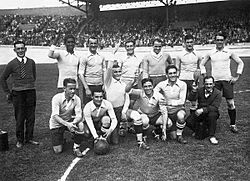Football at the Summer Olympics facts for kids
Quick facts for kids Football at the Summer Olympics |
|
|---|---|
 |
|
| Governing body | FIFA |
| Events | 2 (men: 1; women: 1) |
| Games | |
|
|
|
|
| Tournaments (men・women) | |
Football at the Summer Olympics is a popular sport played at the Summer Olympic Games. It's also called the Olympic Football Tournament. Men's football has been part of almost every Summer Olympics since 1900. The only times it wasn't included were in 1896 (the very first Games) and 1932. Women's football joined the Olympics later, at the Atlanta Games in 1996.
To make sure the Olympic football tournament doesn't compete with the FIFA World Cup, FIFA (the world football governing body) has special rules for the men's teams. Most players must be under 23 years old. However, each team can have three players who are older than 23.
The women's football tournament is different. It's a full international competition for senior players, just like the FIFA Women's World Cup. It's considered the second most important women's football event after the World Cup.
Contents
History of Olympic Football
Early Days of the Tournament
How it Started
Football wasn't played at the first modern Olympic Games in Athens in 1896. International football was still very new back then. Some people say there was an unofficial tournament in 1896, but this isn't officially recognized.
Official tournaments were held at the 1900 and 1904 Games. There was also a tournament at the 1906 Intercalated Games. But these early competitions were played by club teams or mixed teams, not national teams. The IOC (the group that runs the Olympics) counts the 1900 and 1904 tournaments as official. However, FIFA doesn't recognize them. Neither group recognizes the 1906 Games today.
British Teams Win Early Medals
In the London Games of 1908, a proper international tournament was set up. Six teams competed. In 1912, the number of teams grew to eleven. Many early matches had very high scores because the teams weren't always evenly matched. For example, two players, Sophus Nielsen (in 1908) and Gottfried Fuchs (in 1912), each scored ten goals in one game!
All players in these early Olympics had to be amateurs. This meant countries couldn't send their best professional players. Great Britain sent an amateur team from England. This English amateur team won the first two official tournaments, beating Denmark both times.
Uruguay's Rise in the 1920s

At the 1920 Games in Antwerp, the Czechoslovakia team walked off the field during the final against Belgium. They were protesting the referee's decisions. After this, teams from outside Europe, like Egypt, the United States, and Uruguay, started joining in 1924. This made the games more exciting and popular.
Uruguay was very strong in the 1920s. They won all four of their games in 1924, including a 3-0 victory over Switzerland in the final. In 1928, football was the most popular event at the Games. The final was an all-South American match between Uruguay and Argentina. Uruguay won 2-1. Some people even called this game "football's first world championship" because there wasn't a major international tournament like the World Cup yet.
After seeing how popular these tournaments were, FIFA realized that the Olympic rules (only allowing amateurs) didn't show the true strength of international football. This led FIFA to create its own international tournament: the FIFA World Cup.
After the First World Cup
Changes in the 1930s
Because FIFA wanted to promote its new World Cup, football was not included in the 1932 Los Angeles Games. Football returned to the Olympics in 1936 in Berlin, but it was controversial. The Italian team tried to intimidate a referee. Also, Peru won a disputed game against Austria in extra time. Fans even ran onto the field! Austria asked for the game to be replayed, and FIFA agreed. But the Peruvian team refused and left the Olympics.
New Rules and Developments
For the 1984 Los Angeles Games, the IOC decided to allow professional players. However, FIFA still didn't want the Olympics to compete with the World Cup.
So, they made a deal. Countries from Europe (UEFA) and South America (CONMEBOL) had to use players who had not played in a World Cup. Other countries could send their strongest teams. These rules continued for the 1988 Games, with a small change: European and South American players who had played less than 90 minutes in a World Cup game were allowed.
Age Limits Introduced (1992-Present)
Since 1992, male players in the Olympics must be under 23 years old. Since 1996, teams are allowed to have a maximum of three players who are older than 23.
This rule change has helped African countries a lot. For example, Nigeria won gold in 1996, and Cameroon won in 2000. Because of these age limits, some of the traditionally strong men's national teams haven't had amazing Olympic results. For example, Uruguay won before the World Cup started, but then didn't qualify again for 84 years until 2012!
Great Britain's Participation
The United Kingdom has four separate football teams: England, Northern Ireland, Scotland, and Wales. Only the English Football Association (FA) is linked to the British Olympic Association (BOA). Because of this, the FA sent "Great Britain" teams to the Olympics until 1972.
In 1974, the FA stopped the difference between "amateur" and "professional" football. They also stopped sending teams to the Olympics. Even when FIFA allowed professional players in 1984, the FA didn't re-enter. The other UK football associations were worried that a united British Olympic team might cause FIFA to question their separate status in other competitions.
When London was chosen to host the 2012 Games, there was pressure for Great Britain to have a team. In the end, there were Welsh players in the men's team and Scottish players in the women's team. After 2012, the FA decided not to enter a men's team in future Olympics. However, they were open to sending a women's team again. This shows how important Olympic football is for women's international football.
For the 2020 tournament, FIFA said the women's UK team could enter if the four UK football associations agreed. This depended on how the English women's team did in the 2019 FIFA Women's World Cup.
Olympic Football Venues
Football tournaments at the Olympics often use large stadiums in different cities. These cities can be far from the main host city. For example, in the 1984 Games, two early-round venues were on the East Coast of the United States, very far from Los Angeles. In the 1996 Games, no matches were held in the host city of Atlanta. The finals were held 65 miles away in Athens, Georgia. Football has used more venues than any other Olympic sport, with 127 different stadiums hosting games up to the 2020 Games.
Events in Olympic Football
| Event | 96 | 1900 | 04 | 08 | 12 | 20 | 24 | 28 | 32 | 36 | 48 | 52 | 56 | 60 | 64 | 68 | 72 | 76 | 80 | 84 | 88 | 92 | 96 | 2000 | 04 | 08 | 12 | 16 | 20 | 24 | Years |
|---|---|---|---|---|---|---|---|---|---|---|---|---|---|---|---|---|---|---|---|---|---|---|---|---|---|---|---|---|---|---|---|
| Men's event | X | X | X | X | X | X | X | X | X | X | X | X | X | X | X | X | X | X | X | X | X | X | X | X | X | X | X | X | 28 | ||
| Women's event | X | X | X | X | X | X | X | X | 8 | ||||||||||||||||||||||
| Total | 0 | 1 | 1 | 1 | 1 | 1 | 1 | 1 | 0 | 1 | 1 | 1 | 1 | 1 | 1 | 1 | 1 | 1 | 1 | 1 | 1 | 1 | 2 | 2 | 2 | 2 | 2 | 2 | 2 | 2 |
Competition Format
Both the men's and women's tournaments have two main parts: a group stage and a knockout stage.
In the group stage, teams are put into groups of four. Each team plays every other team in its group once.
- Teams get 3 points for a win.
- 1 point for a draw (a tie).
- 0 points for a loss.
The top two teams from each group move on to the knockout rounds. In the women's tournament, the two best third-place teams also advance.
The knockout rounds are single-elimination. This means if a team loses, they are out of the tournament. These rounds include quarterfinals, semifinals, and then the gold and bronze medal matches.
Matches are played in two halves of 45 minutes each. If a knockout game is tied after 90 minutes, they play two extra 15-minute halves. If it's still tied after extra time, the winner is decided by penalty kicks. This is usually 5 rounds, with more if it's still tied. (Note: For the bronze medal match, if it's played on the same day and stadium as the gold medal match, they might go straight to penalty kicks if it's a tie after 90 minutes).
To qualify for the Olympics, teams usually play in special tournaments organized by their continent. For men's football, most of these are for Under-23 teams. For example, European teams qualify through the UEFA Under-21 Championship.
For the 2024 Games, here's how many spots each continent gets:
- Europe – 4 teams (this includes host country France)
- Asia – 3 or 4 teams
- Africa – 3 or 4 teams
- South America – 2 teams
- North America – 2 teams
- Oceania – 1 team
Team Types Over Time
The rules for which players can compete in Olympic football have changed a lot:
Men's Teams
- 1900–1904: Club teams played, not national teams.
- 1908–1964: National teams played, but all players had to be amateurs.
- 1968–1980: National amateur teams.
- 1984–1988: National teams could have professional players. But for teams from Europe and South America (the strongest football regions), players who had played in the World Cup were not allowed.
- 1992: National teams made up of players under 23 years old (U23).
- 1996–Present: National U23 teams, with a maximum of three players allowed to be over 23 years old.
Women's Teams
- 1996–Present: Full national teams, with no age restrictions.
Men's Tournament
 |
|
| Organising body | IOC FIFA |
|---|---|
| Founded | 1900 |
| Region | International |
| Number of teams | 16 (finals) (from 6 confederations) |
| Current champions | (2nd title) |
| Most successful team(s) | (3 titles each) |
Men's Tournament Results
Here are the winners and medalists for the men's Olympic football tournament:
- Rules for teams
- 1896–1904: Club teams played.
- 1908–1980: Amateur national teams played.
- 1984: Professional players were allowed, except for teams from Europe and South America.
- 1988: Professional players were allowed, but not those who had played in the FIFA World Cup.
- 1992: Teams were made of players under 23 years old (U23).
- 1996–Present: U23 national teams, with three older players allowed per team.
| Ed. | Year | Hosts | Gold medal match | Bronze medal match | Num. teams |
||||
|---|---|---|---|---|---|---|---|---|---|
| Score | Score | Fourth place | |||||||
| – | 1896 | Athens |
|
||||||
| 1 | 1900 | Paris |
|
|
|
|
|||
| 2 | 1904 | St. Louis |
|
|
|
|
|||
| 3 | 1908 | London |
|
|
|
||||
| 4 | 1912 | Stockholm |
|
|
|
||||
| 5 | 1920 | Antwerp |
|
|
|
||||
| 6 | 1924 | Paris |
|
|
|
||||
|
|
|||||||||
| 7 | 1928 | Amsterdam |
|
|
|
||||
|
|
|||||||||
| – | 1932 | Los Angeles |
|
||||||
| 8 | 1936 | Berlin |
|
|
|
||||
| 9 | 1948 | London |
|
|
|
||||
| 10 | 1956 | Melbourne |
|
|
|
||||
| 11 | 1960 | Rome |
|
|
|
||||
| 12 | 1964 | Tokyo |
|
|
|
||||
| 13 | 1968 | Mexico City |
|
|
|
||||
| 14 | 1972 | Munich |
|
|
|
|
|||
| 15 | 1976 | Montreal |
|
|
|
||||
| 16 | 1980 | Moscow |
|
|
|
||||
| 17 | 1984 | Los Angeles |
|
|
|
||||
| 18 | 1988 | Seoul |
|
|
|
||||
| 19 | 1992 | Barcelona |
|
|
|
||||
| 20 | 1996 | Atlanta |
|
|
|
||||
| 21 | 2000 | Sydney |
|
|
|
||||
| 22 | 2004 | Athens |
|
|
|
||||
| 23 | 2008 | Beijing |
|
|
|
||||
| 24 | 2012 | London |
|
|
|
||||
| 25 | 2016 | Rio de Janeiro |
|
|
|
||||
| 26 | 2020 | Tokyo |
|
|
|
||||
| 27 | 2024 | Paris | TBD | TBD | TBD | TBD | |||
Men's Tournament Medals by Country
Here are the countries that have won medals in men's Olympic football:
| Team | Gold medals | Silver medals | Bronze medals | Fourth place | Medals |
|---|---|---|---|---|---|
| 3 (1952, 1964, 1968) | 1 (1972) | 1 (1960) | 5 | ||
| 3 (1900, 1908, 1912) | 1 (1948) | 3 | |||
| 2 (2016, 2020) | 3 (1984, 1988, 2012) | 2 (1996, 2008) | 1 (1976) | 7 | |
| 2 (2004, 2008) | 2 (1928, 1996) | 4 | |||
| 2 (1956, 1988) | 3 (1972, 1976, 1980) | 5 | |||
| 2 (1924, 1928) | 2 | ||||
| 1 (1960) | 3 (1948, 1952, 1956) | 1 (1984) | 1 (1980) | 5 | |
| 1 (1992) | 3 (1920, 2000, 2020) | 4 | |||
| 1 (1972) | 2 (1976, 1992) | 1 (1936) | 3 | ||
| 1 (1976) | 1 (1980) | 1 (1972) | 3 | ||
| 1 (1996) | 1 (2008) | 1 (2016) | 3 | ||
| 1 (1980) | 1 (1964) | 2 | |||
| 1 (1984) | 1 (1900) | 2 | |||
| 1 (1936) | 2 (1928, 2004) | 4 (1920, 1960, 1984, 1988) | 3 | ||
| 1 (1948) | 2 (1924, 1952) | 1 (1908) | 3 | ||
| 1 (2012) | 1 (2020) | 1 (1968) | 2 | ||
| 1 (1920) | 1 (1900) | 1 (2008) | 2 | ||
| 1 (1904) | 1 | ||||
| 1 (2000) | 1 | ||||
| 3 (1908, 1912, 1960) | 1 (1948) | 4 | |||
| 1 (1904) | 1 (1904) | 1 (2000) | 2 | ||
| 1 (1968) | 1 (1956) | 2 | |||
| 1 (2016) | 1 (1952) | 1 | |||
| 1 (1924) | 1 | ||||
| 1 (1936) | 1 | ||||
| 1 (2004) | 1 | ||||
| 3 (1908, 1912, 1920) | 1 (1924) | 3 | |||
| 1 (1968) | 2 (2012, 2020) | 1 | |||
| 1 (1936) | 1 | ||||
| 1 (1964) | 1 | ||||
| 1 (1988) | 1 | ||||
| 1 (1992) | 1 | ||||
| 1 (2000) | 1 | ||||
| 1 (2012) | 1 | ||||
| 2 (1928, 1964) | 0 | ||||
| 1 (1912) | 0 | ||||
| 1 (1956) | 0 | ||||
| 1 (1992) | 0 | ||||
| 1 (1996) | 0 | ||||
| 1 (2004) | 0 | ||||
| 1 (2016) | 0 |
Women's Tournament
 |
|
| Organising body | IOC FIFA |
|---|---|
| Founded | 1996 |
| Region | International |
| Number of teams | 12 (finals) (from 6 confederations) |
| Current champions | (1st title) |
| Most successful team(s) | (4 titles) |
The women's tournament is played by the full national teams, meaning there are no age limits for players. One spot in the tournament is always saved for the host country. For the other teams, a certain number of spots are given to each continent. For example, European teams used to qualify based on their performance in the previous year's FIFA Women's World Cup. Starting in 2024, the UEFA Women's Nations League Finals will be used for European qualification. Other continents hold their own qualifying tournaments.
The first women's Olympic football tournament was at the 1996 Atlanta Games. The United States won the gold medal. In 2000, Norway beat the U.S. with a "golden goal" in extra time. This goal was very controversial because it looked like a handball, but it was still allowed.
The finals in 2004 and 2008 also went into extra time, with the U.S. beating Brazil both times. In 2012, the U.S. won their fourth gold medal by defeating Japan 2-1. In 2016, Germany won its first gold medal, beating Sweden in the final. In 2020, Canada won gold after a penalty shootout against Sweden.
For the 2024 Games, here's how many spots each continent gets for women's football:
- Europe – 3 teams (includes host country France)
- Africa – 2 teams
- Asia – 2 teams
- South America – 2 teams
- North America – 2 teams
- Oceania – 1 team
Women's Tournament Results
Here are the winners and medalists for the women's Olympic football tournament:
| Ed. | Year | Hosts | Gold medal match | Bronze medal match | Num. teams |
||||
|---|---|---|---|---|---|---|---|---|---|
| Score | Score | Fourth place | |||||||
|
|
1996 | Atlanta |
|
|
|
||||
|
|
2000 | Sydney |
|
|
|
||||
|
|
2004 | Athens |
|
|
|
||||
|
|
2008 | Beijing |
|
|
|
||||
|
|
2012 | London |
|
|
|
||||
|
|
2016 | Rio de Janeiro |
|
|
|
||||
|
|
2020 | Tokyo |
|
|
|
||||
|
|
2024 | Paris | TBD | TBD | TBD | TBD | |||
Women's Tournament Medals by Country
Here are the countries that have won medals in women's Olympic football:
| Team | Gold medals | Silver medals | Bronze medals | Fourth place | Medals |
|---|---|---|---|---|---|
| 4 (1996, 2004, 2008, 2012) | 1 (2000) | 1 (2020) | 6 | ||
| 1 (2016) | 3 (2000, 2004, 2008) | 4 | |||
| 1 (2020) | 2 (2012, 2016) | 3 | |||
| 1 (2000) | 1 (1996) | 2 | |||
| 2 (2004, 2008) | 3 (1996, 2000, 2016) | 2 | |||
| 2 (2016, 2020) | 1 (2004) | 2 | |||
| 1 (2012) | 1 (2008) | 1 | |||
| 1 (1996) | 1 | ||||
| 1 (2020) | 0 | ||||
| 1 (2012) | 0 |
Overall Medal Table
This table shows all medals won in both men's and women's Olympic football, including the early tournaments in 1900 and 1904. Note that in 1972, two bronze medals were given out.
| Rank | Nation | Gold | Silver | Bronze | Total |
|---|---|---|---|---|---|
| 1 | 4 | 2 | 2 | 8 | |
| 2 | 3 | 1 | 1 | 5 | |
| 3 | 3 | 0 | 0 | 3 | |
| 4 | 2 | 5 | 2 | 9 | |
| 5 | 2 | 2 | 0 | 4 | |
| 6 | 2 | 0 | 3 | 5 | |
| 7 | 2 | 0 | 2 | 4 | |
| 8 | 2 | 0 | 0 | 2 | |
| 9 | 1 | 3 | 1 | 5 | |
| 10 | 1 | 3 | 0 | 4 | |
| 11 | 1 | 2 | 2 | 5 | |
| 12 | 1 | 2 | 0 | 3 | |
| 13 | 1 | 1 | 3 | 5 | |
| 14 | 1 | 1 | 1 | 3 | |
| 1 | 1 | 1 | 3 | ||
| 16 | 1 | 1 | 0 | 2 | |
| 1 | 1 | 0 | 2 | ||
| 18 | 1 | 0 | 2 | 3 | |
| 1 | 0 | 2 | 3 | ||
| 20 | 1 | 0 | 1 | 2 | |
| 21 | 1 | 0 | 0 | 1 | |
| 1 | 0 | 0 | 1 | ||
| 23 | 0 | 3 | 1 | 4 | |
| 24 | 0 | 1 | 1 | 2 | |
| 0 | 1 | 1 | 2 | ||
| 26 | 0 | 1 | 0 | 1 | |
| 0 | 1 | 0 | 1 | ||
| 0 | 1 | 0 | 1 | ||
| 0 | 1 | 0 | 1 | ||
| 30 | 0 | 0 | 3 | 3 | |
| 31 | 0 | 0 | 1 | 1 | |
| 0 | 0 | 1 | 1 | ||
| 0 | 0 | 1 | 1 | ||
| 0 | 0 | 1 | 1 | ||
| 0 | 0 | 1 | 1 | ||
| 0 | 0 | 1 | 1 | ||
| Totals (36 entries) | 34 | 34 | 35 | 103 | |
See also
 In Spanish: Fútbol en los Juegos Olímpicos para niños
In Spanish: Fútbol en los Juegos Olímpicos para niños
- Football at the Youth Olympic Games
 | Sharif Bey |
 | Hale Woodruff |
 | Richmond Barthé |
 | Purvis Young |

